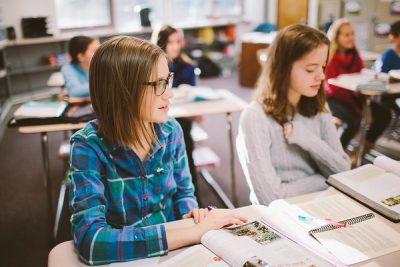May 11, 2017
by Dr. Bill Hudson, Head of School
Several years ago, a battle was waging between parents in the form of bumper stickers. For every “My Child is on the Honor Roll at Lakeside Elementary,” there was one that read, “All Children are Honored at Creekside Elementary.” The bumper stickers were symptomatic of an overall conversation about how to meet the needs of all learners. The problem, in my opinion, was that the conversation focused on only one dimension of education, the intellect. There is more to education than ability.
While I don’t see as many of those bumper stickers as I once did, educators have yet to find the appropriate way to frame the conversation that is inclusive of all learners, on both ends of the spectrum. Special education programs have been mainstream for many years. In recent years, many school districts have created discreet gifted and talented programs. Together with comprehensive programs, these offerings segment learners in order to meet their needs.
At MPA we embrace every child’s differences and offer an individualized journey that reveals who he or she is truly meant to be. We know that not every child benefits from the same approach, which is why MPA takes a student-centered approach to each individual. In part because of small class sizes, teachers have the opportunity to truly get to know each student personally. This approach enables teachers to prepare a learning plan built upon a student’s strengths, challenges, and unique learning style.
While MPA does not have a formal gifted and talented program, we provide pathways and opportunities for exceptional learners along the continuum of intellect and ability. Lower School fourth grade teacher Mrs. Stacy describes it this way, “At MPA gifted students are offered avenues to pursue their passions within the academic and artistic disciplines. An assigned ‘report’ on a figure from history might turn into a dramatic presentation in first person, written by such a student. Or a math student who easily averages a set of numbers might find herself with the next ‘step’—finding a missing addend—while her classmates continue to work on more basic concepts.” Teachers know that every learner is unique and no two brains are wired exactly alike. “No matter the level, teachers stay one step ahead of the students, much like an orchestrated game of tag … always moving, and always ready to lead to the next level,” says Mrs. Stacy.
Differentiated and personalized learning occurs across divisions and grade levels. Experienced teachers work very hard to create meaningful yet engaging lessons designed to challenge all learners. In the Middle and Upper Schools, division directors work with students, teachers, and families to find the right fit in subject areas such as math and language where students can be matched with the appropriate challenge. Programs such as i-Term in the Middle School provide gifted learners with both voice and choice to explore their curiosity and interests.
We believe exposure to a variety of subject matter, disciplines, and experiences creates independent, critical thinkers who are able to solve problems with more tools at their disposal.
We also recognize, however, that some students have a passion within a discipline that drives them. For these students, the Upper School Certificates of Distinction Program recognizes that passion while staying committed to a balanced education with deep delves into all subjects. It was designed with the belief that Upper School students can be architects of their education.
Gifted learners in the Upper School have access to the Malone Online School Network courses that take a blended approach to teaching, combining real-time (synchronous) video conferencing seminars with asynchronous recorded lectures and exercises for students to master outside of class. Class sizes range from a minimum of six to a maximum of 16 students. The result: virtual, robust discussion seminars, delivered in a specifically designed, high-definition classroom. Students become architects of their own learning by utilizing innovative tools to demonstrate their knowledge across and between disciplines.
In addition to providing appropriate academic challenge for gifted and talented students, we strongly believe that the arts and physical education are essential. The National Association for Gifted Children emphasizes the importance of arts for all children, with special benefit for those who are gifted and talented. Drama, music, and art play an important role in cognitive, affective, and psychomotor development. Likewise, a commitment to physical education and unstructured play are equally important. Many gifted and talented programs leave little time and give little attention to these essential disciplines.
Lauren B. Resnick (1999) of the University of Pittsburgh reminds us that, “one’s intelligence is the sum of one’s habits of mind.” Intellect is but one part of the whole. Fostering interdependent, flexible, and creative thinking are habits of the mind that fuel and sustain the intellect. At MPA, we encourage students to pursue individual and unique passions, sustain their innate curiosity, and work collaboratively to create solutions to complex problems.
Noted educational researcher Dr. Carol Ann Tomlinson describes an approach that fits well with our understanding of gifted and talented education at MPA. She writes, “It begins with the premise every each child should come to school to stretch, wonder, and grow daily. It includes the expectation that the measure of progress and growth is competition with oneself rather than competition against others.” Much more than a bumper sticker or a discreet program, teaching gifted learners is approached holistically at MPA.